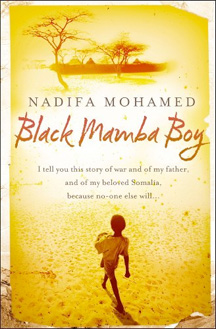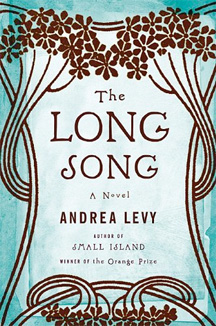 Nadifa Mohamed's Black Mamba Boy
Nadifa Mohamed's Black Mamba Boy
Harper Collins, 2010
And it's a story that I think hasn't been told before": that’s how Nadifa Mohamed describes her first novel, Black Mamba Boy in this video.Maybe that’s a tall order for a novel in 2010. And, then again, maybe not.
Consider this. In 1990, the Columbian Ministry of Culture set up an itinerant library, whereby donkeys carted practical tomes on agricultural techniques, water filtration, veterinary medicine, and sewing patterns to serve distant rural populations. The books were made available centrally to villagers and, after a time, they were swapped out for new selections.
Each of these loaned books was returned properly when it was time for the exchange, until one village refused to return one book: The Iliad, which, eventually, was given to them to keep. “They explained that Homer’s story exactly reflected their own: it told of a wartorn country in which mad gods wilfully decide the fate of humans who never know exactly what the fighting is about, or when they will be killed.”*
Maybe the characters in Black Mamba Boy would believe Homer’s story exactly reflected their own. In fact, you can easily imagine Nadifa Mohamed’s characters in Djibouti, Eritrea, Somalia and Sudan making the same claim that the Columbia villagers made. And certainly this debut novel tackles epic themes (although I haven’t read The Iliad straight through, so I can’t offer more direct parallels than the villagers’ comments).
Nadifa Mohamed tells her father’s story through Jama: “I am my father’s griot, this is a hymn to him.” A griot is a wandering poet and storyteller, who is considered a repository of oral tradition in African countries, so it shouldn’t be surprising that Mohamed’s tale begs to be read aloud from the first page.
The attention she pays to descriptions that encapsulate a scene, the scarce bits of direct dialogue, the long phrases that follow one another like bread crumbs through the woods: I read more than half of this novel aloud, which also slowed me down, and I think that’s a good thing because despite the swath of time this novel covers, this prose doesn’t want to be rushed.
You would want to take your time anyway if the setting was unfamiliar, and there’s a map at the novel’s opening to help you place the characters and the events of the story. (Actually, I would have found a glossary helpful too, but I realize it would have put off some readers, and I managed okay without it.) Here’s a sample of the way that Nadifa Mohamed brings the land to life:
Djibouti was low-down and hot, it looked even more barren and fearsome than Somaliland and the few trees that dared exist held up their arms in defeat. Rocks cracked open in fifty degree heat. The earth was bleached white and the few comforts that the Somali desert shyly held out, blossoming cacti, large matronly bushes, lush candelabra euphorbia, were here maliciously denied. The air had a corruption to it, a mingled scent of sleaze, sweat and goat droppings. (79)
In some ways, however, the novel’s themes traverse geographic and cultural boundaries. For instance, above all, Jama longs for his mother and father, for a place to belong.
“Jama looked up at the sky, beside the moon was a bright star he had never noticed before, it flickered and winked at him. As Jama squinted he saw a woman sitting on the star, her small feet swinging under her robe and her arm waving down at him. Jama waved to his mother and she smiled back, blowing shooting star kisses down on him.”
“All those promises his mother had made about him being the sweetheart of the stars looked to him as if they would finally come to pass. He was going to be a normal boy with a real father, he wanted his father above anything else in the world, he was becoming a man and needed a father to light the way. Jama had so many questions for Guure. Where did you go? What have you being doing in Sudan? Why did you not come back for me? Jama felt ready to explode; his sentence was finally over.” (99)
But Jama’s sentence is not over; one hundred pages — one third of the way — into the narrative and, really, his search is just beginning. And, although it is epic in nature, although the tale strikes universal chords, what Nadifa Mohamed says is true: Jama’s story has not been told before. She explains that experiences like her father’s are “often written about but very rarely have their perspective represented” and she has brought that to Black Mamba Boy.
* This anecdote is relayed in Alberto Manguel’s The Library at Night (230), based on a personal interview conducted in Bogotá May 25, 2001. If you have one (a library), and don’t have a copy of this one (Manguel’s book), you should get one (978-0-676-97588-8). Right now.
PS I originally posted this to Buried In Print.

 )
)











 )
)



 )
)


 )
)





 The Idea of Perfection
The Idea of Perfection
Dalia Sofer’s debut novel, The Septembers of Shiraz, shows how detrimental the Iranian Revolution was for many of Iran’s citizens. Isaac Amin was a rare gem dealer who was arrested by the Revolutionary Guards in September 1981. Isaac was Jewish and had prospered well under the Shah, which made him suspicious in the eyes of the new regime. He was transported to prison where he was questioned, tortured and accused of being a Zionist spy.
The story shifts from Isaac’s point of view to that of his wife, Farnaz; his young daughter, Shirin; and his son, Parviz, a college student living in New York. The alternating viewpoints showed how each family member dealt with the sudden disappearance of Isaac. With emotions ranging from fear to courage, the Amin family tried to manage their day-to-day lives without the presence of their patriarch.
I found The Septembers of Shiraz to be a captivating read. The Iranian Revolution is an unfamiliar topic for me, and the rigid conditions of this time make me wonder how anyone escaped arrest and execution. I rooted for each member of the Amin family as they struggled with Isaac’s imprisonment. Sofer’s writing style was lyrical yet approachable, drawing her readers into the story. If you are a fan of historical fiction, I would recommend this amazing story. I look forward to more books by this talented young author. (